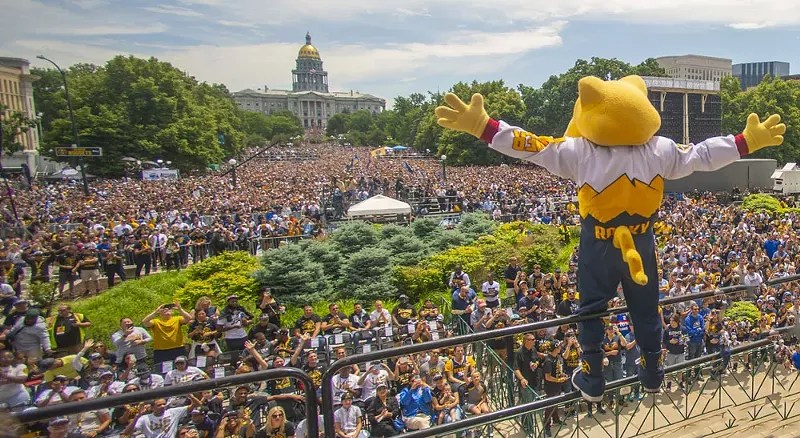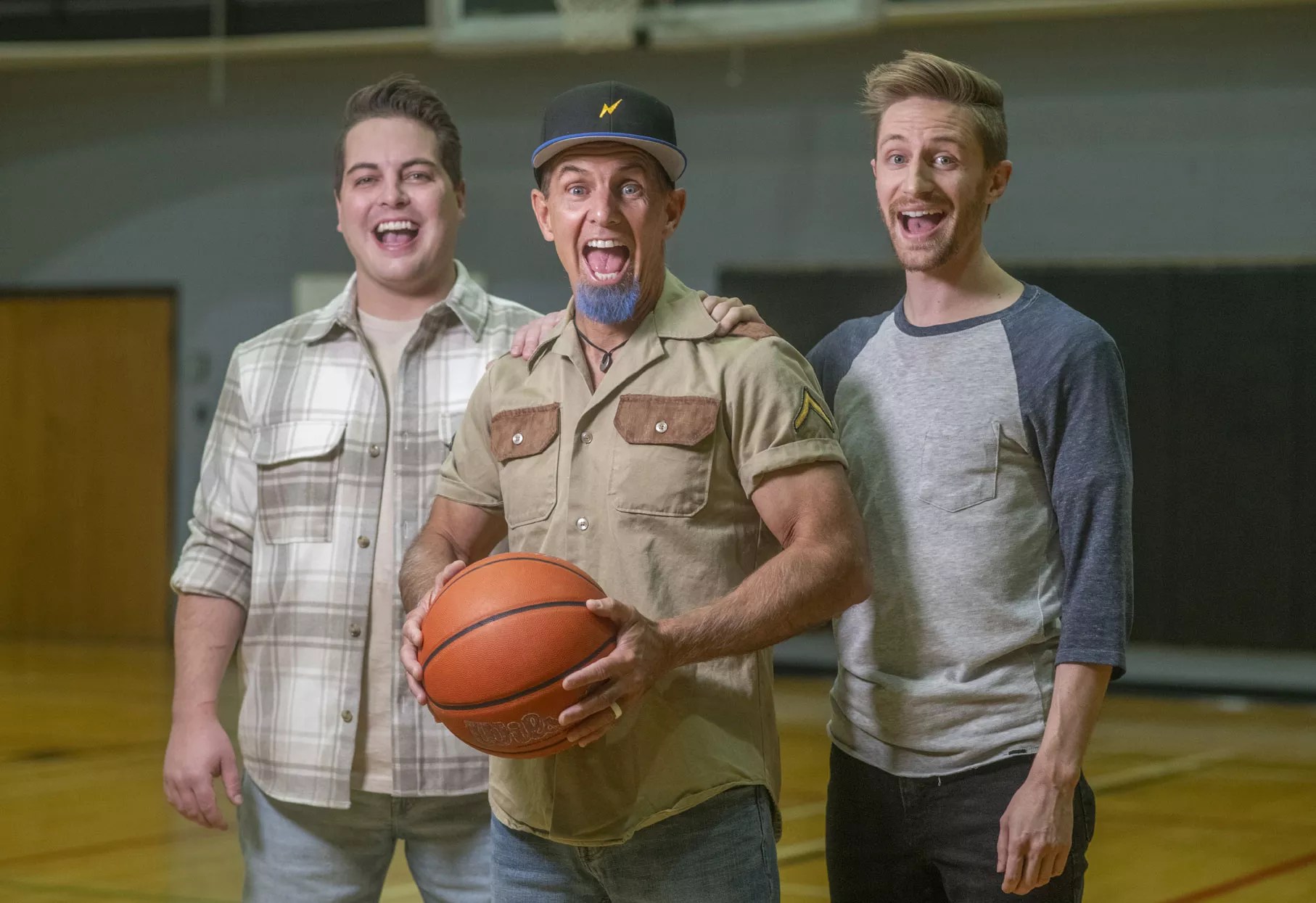
Evan Semon

Audio By Carbonatix
Attorneys for Drake Solomon, who succeeded his father as Rocky, the Denver Nuggets’ beloved mountain lion mascot, have filed a lawsuit against the Nuggets’ ownership group, Kroenke Sports & Entertainment, as well as two team supervisors for illegal disability discrimination and retaliation after Drake was fired in August 2024 following hip-replacement surgery.
Kenn Solomon first suited up as Rocky, the mountain lion with the lightning bolt tail, on December 15, 1990; he soon became the most popular mascot in Colorado sports, known for his backwards half-court shots at the hoop. In 2012, Drake went to work for the Nuggets as a trampoline dunk artist and member of the “Promo Squad,” and when his father retired in 2021, Drake was the only candidate to succeed Kenn as Rocky. Westword told the saga of the father-son mascot duo last October.
Drake and his brothers had been on the Nuggets’ court and in the locker room since they were tots watching their dad perform – a happenstance mentorship that provided Drake (and his brother Garett, who presently performs as Hooper, the Detroit Pistons’ mascot) with the training he’d need to succeed Kenn. (The third brother, Cade, works in video production.)
In his second season as Rocky, the Nuggets’ 2022-2023 championship run, Drake began experiencing pain in his right hip after a bout of COVID, subsequently diagnosed as avascular necrosis, a condition in which his femur bones weren’t getting enough blood flow, causing them to degenerate. Drake had surgery to treat the condition in March 2023, and returned as Rocky after the championship season ended. But the pain endured, and in February 2024 doctors said he needed a double hip replacement.

Drake Solomon (left), with his father, former Rocky mascot Kenn Solomon, and brother Cade Solomon.
Evan Semón
Drake’s lawsuit alleges that two of his supervisors, Steve Johnston and Craig Dzaman, said he was unreliable when he again needed medical leave, and told Drake that the organization would hold tryouts for the job of Rocky, “regardless of the outcome” of his surgery. “I was told that I burned them last time and they couldn’t sit there and rely on or expect that I’m going to come back the same way or 100 percent,” Drake says in an interview at his attorneys’ office.
When Drake returned to work post-surgery on May 20, 2024, he says he faced a hostile work environment, but kept showing up – his first appearance was in the Juneteenth parade that year. “I got a doctor’s note. I got cleared. I’m feeling no pain at this point,” Drake says. “I’m able to dunk, I’m able to run, I’m working out again.”
He says his supervisors didn’t interact with him for two weeks while he was making appearances as Rocky and working on skits and routines for the upcoming basketball season. When he did hear from them, he was told there would still be tryouts.
Early last August, Drake and three other candidates participated in the tryouts for Rocky – but Drake says his supervisors asked him to show the other contenders how to properly dunk a basketball, and how to properly land. About a week and a half later, on August 13, Drake showed up for work at his office, but at the end of the day he was terminated and escorted out of the building by security.
Drake filed his lawsuit 364 days later, under the Colorado Antidiscrimination Act in Denver District Court. “We believe that a Denver jury should get to determine what happens with a Denver team,” says Siddhartha Rathod, a partner at the firm representing Drake.
Besides the unlawful disability-based discrimination and termination claims, the lawsuit also seeks to establish a class action for all former Kroenke employees who were presented with the same severance agreement, which Drake’s attorneys charge violated multiple provisions of Colorado’s Protecting Opportunities and Workers’ Rights (POWR) Act. They allege the severance agreement was missing required language setting forth Drake’s rights after his termination.
As for the class-action claim regarding Drake’s severance agreement and any others like it, attorney Rathod says: “It’s really clean-cut. There is no gray area. Any time a company provides a severance agreement or a settlement agreement, the law is really clear and specific.” He says some confidentiality is allowed in such agreements, but confidentiality cannot be the underlying term.
And while there was a non-disparagement clause, it only applied to Drake, while the law stipulates those must be mutual non-disparagement agreements.
Drake says he’s still a Nuggets fan. “They’re our second family,” he explains. “They’re everything to us. This was not an easy decision at all for me to pursue this; there were times I was in tears talking to my dad about it. But what I narrowed it down to is, it’s about right and wrong. I hope this helps current employees and future employees from being treated like this.”
He says he misses the off-court appearances as much as the performances in Ball Arena, and mentions the annual Christmas toy drive at Children’s Hospital. “All that was a big part of why we do what we do,” he says. He recalls a time when he was assisting his dad and they visited two young boys who’d just lost their parents in a car accident. “Somehow Rocky was able to put a smile on their faces, and at least gave them a little positive light at the end of this tragic thing that happened,” he says.
Though rumors have swirled about his father receiving a large salary as Rocky, Drake says he made just $70,000 a year from the Nuggets. “We wish a Solomon could be there [at the Nuggets games] in costume and still bring you the quality and professionalism and joy – that real authentic Rocky touch – to everybody, and to change people’s lives and make their day,” Drake says. “We wish we were still part of it. This is nothing personal with the Nuggets, we love them. It’s always going to be our team.”
But Drake says he hasn’t been able to watch the Nuggets since he was fired. In fact, he’s moved to Texas, where he hopes to get back in the mascot game. “It’s been too painful, it’s probably going to be a while before I watch a Nuggets game,” he says. “A month after I got fired, the Rockymobile was parked around the corner from my apartment complex for an appearance – I’m like, ‘I’ve gotta get out of here.’ It’s gonna just take some time to heal.”
The lawsuit, which was filed on August 12, seeks to recover economic and compensatory damages plus interest, along with punitive damages, attorneys’ fees, and $5,000 per violation for Drake and others in the class who received the same severance agreement.
The Denver Nuggets/KSE media teams have not yet responded to a request for comment. This story has been updated to include comments from Drake Solomon.